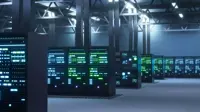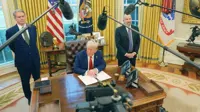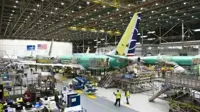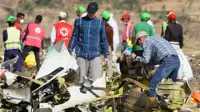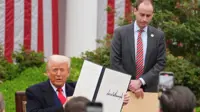Aero India is all about ‘Make in India’, says Modi
18 Feb 2015
A strong Indian defence industry will not only make India more secure. It will also make India more prosperous. Aero India can be a catalyst in realising the potential of the 'Make in India' programme, Prime Minister Narendra Modi said while inaugurating the Aero India 2015 at the Yelahanka Air Force base in Bangalore today.
 The fourth edition of Aero India is also the largest ever air show in India and this reflects a new level of confidence within our country and global interest in India, the prime minister said, adding, ''To many of you, India is a major business opportunity.''
The fourth edition of Aero India is also the largest ever air show in India and this reflects a new level of confidence within our country and global interest in India, the prime minister said, adding, ''To many of you, India is a major business opportunity.''
''We have the reputation as the largest importer of defence equipment in the world. That may be music to the ears of some of you here. But, this is one area where we would not like to be Number One!
''Our security challenges are well known. Our international responsibilities are evident. We do need to increase our defence preparedness. We do have to modernise our defence forces. We have to equip ourselves for the needs of the future, where technology will play a major role,'' he said .
India, as a nation of one billion people, has also huge requirements for managing internal security, and with increasingly integration of technology and systems into it, he said, Aero India opens up huge opportunities for international players.
''For me, this is not just a trade fair for defence equipment. This is a mega meeting of one of the largest global supply chains, with the most advanced technology and complex equipment.. And, a platform to launch India's defence manufacturing sector,'' Modi said.
In a country which continues to import nearly 60 per cent of its defence equipment, defence industry can boost investment, expand manufacturing, support enterprise, raise the technology level and increase economic growth in the country.
In India, the defence industry in the government sector alone employs nearly 200,000 workers and thousands of engineers and scientists. They produce an output of nearly $7 billion annually. It also supports a very large pool of small and medium enterprises, he said.
He said, the defence industry in the private sector, although still small, already employs thousands of people.
And, we are spending tens of billions of dollars on acquisitions from abroad. This cannot go on indefinitely, he said.
Studies show that even a 20 to 25 per cent reduction in imports could directly create an additional 100,000 to 120,000 highly skilled jobs in India. If we could raise the percentage of domestic procurement from 40 per cent to 70 per cent in the next five years, we would double the output in our defence industry.
''Imagine the impact in terms of jobs created directly and in the related manufacturing and services sector!
''Think of the spin off benefits on other sectors in terms of advanced materials and technologies!
''That is why we are focusing on developing India's defence industry with a sense of mission,'' Modi said .
He said industrial licensing requirements have been eliminated for a number of items. Where it is needed, the process has been simplified. The government is expanding the role of private sector, even for major platforms. The goal is to provide a level playing field for all.
Yet, he said, offsets system is a crucial instrument to develop and upgrade our defence industry. However, the offset policy has been reformed significantly. ''I am acutely aware that it still needs a lot of improvements. We will pursue them in consultation with domestic industry and our foreign partners,'' he added.
''I want our offsets policy not as a means to export low-end products, but to acquire state-of-the art technology and skills in core areas of priority.
''Government's support for research and development is essential for defence sector. And, it should also be accompanied by a degree of assurance on purchase.
He said the government is introducing a scheme to provide up to 80 per cent of funding for development of a prototype in India. And, will soon launch a Technology Development Fund to support it.
''For too long, our research and development has been confined to government laboratories. We must involve our scientists, soldiers, academia, industry and independent experts more closely in research and development,'' he said.
He said the government is reforming its defence procurement policies and procedures. There would be a clear preference for equipment manufactured in India. It would also ensure simplicity, accountability and speedy decision making.
For this, he said the government has now permitted foreign direct investment of up to 49 per cent.''This can go higher, if the project brings state-of-the art technology,'' he added.
Besides, India has permitted investments up to 24 per cent by foreign institutional investors. The need to have a single Indian partner with 51 per cent stake has also been done away with, he pointed out.



